Harrogate calling: When Eurovision came to Yorkshire
- Published
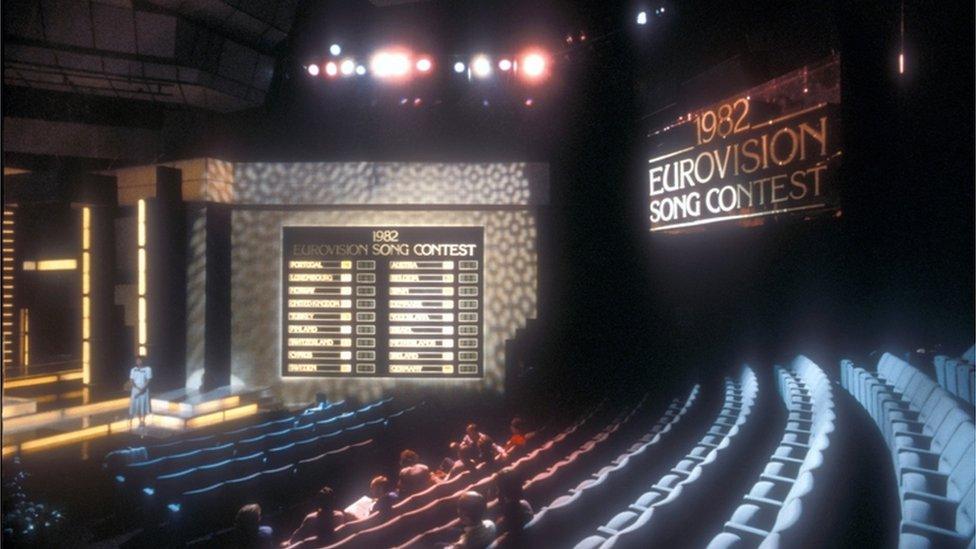
The glitz and glamour of Eurovision came to the newly-built Harrogate International Centre on 24 April 1982
When Buck's Fizz narrowly won the 1981 Eurovision Song Contest in Dublin, it meant the United Kingdom also won the right to host the following year's contest.
The question was: where would this important musical showcase be held on Saturday 24 April 1982?
The answer, which perhaps came as a surprise to many, especially those further afield, was the North Yorkshire spa town of Harrogate.
It would be the seventh time the UK had hosted the contest and, as national broadcaster, it was the BBC's decision to bring the glitz and glamour of Eurovision to Yorkshire.
It was the first time the event had ever been held in northern England - with previous contests having taken place in locations such as London, Brighton and Edinburgh - and the BBC's choice of venue was the newly-built Harrogate International Centre.
To mark the 40th anniversary of the contest coming to Yorkshire, the BBC has spoken to three people who were there on that very special night.
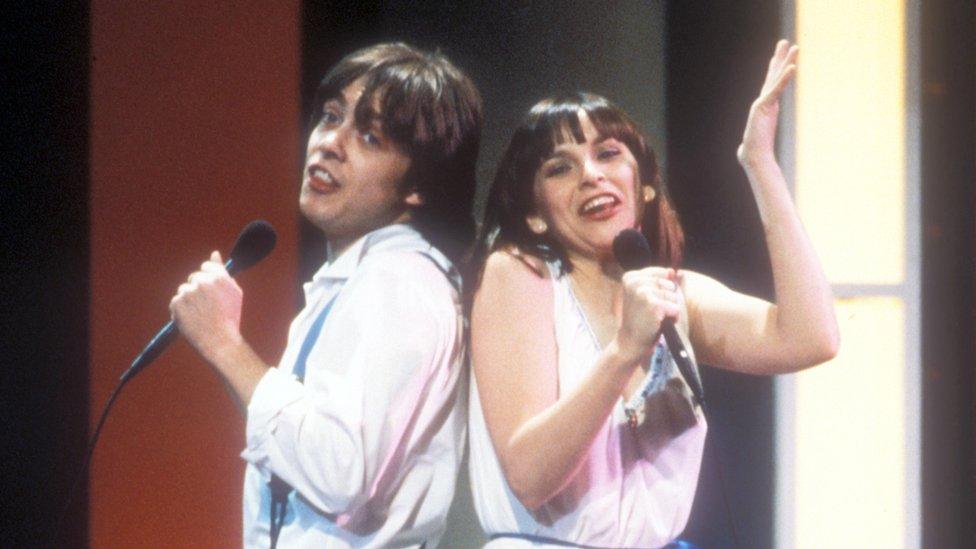
Bardo were the UK's entry for the 1982 Eurovision Song Contest in Harrogate
Writer and broadcaster John Kennedy O'Connor, who has written an official history of the Eurovision Song Contest, was one of those lucky enough to be at the 1982 show.
He said: "It was a little bit of a strange decision. I think a lot of people said, 'where?'. And, in fact, they did this cheeky opening video at the start of the contest asking, 'where is Harrogate?'."
Mr O'Connor said he believed the fact many European viewers would have never heard of Harrogate helped create a bit of a buzz and a sense of intrigue about that year's contest.
"For it to go to this really quite small town was quite a brave thing. That, in itself, proved an attraction, and that's probably what they were looking for.
"They were trying to sell the novelty of the town."
Although the Harrogate venue was newly-constructed and could seat 2,000 people, it posed a challenge for the production team, he said.
In fact, a third of the seats had to be removed from the venue to allow room for the stage and the commentary boxes.
"I remember getting inside and thinking, my goodness, how tiny it was," he said.
There was also some TV sleight-of-hand.
"The whole thing of the luxury cars arriving and Harrogate celebrities walking the lobbies was all recorded a few days earlier," he said.
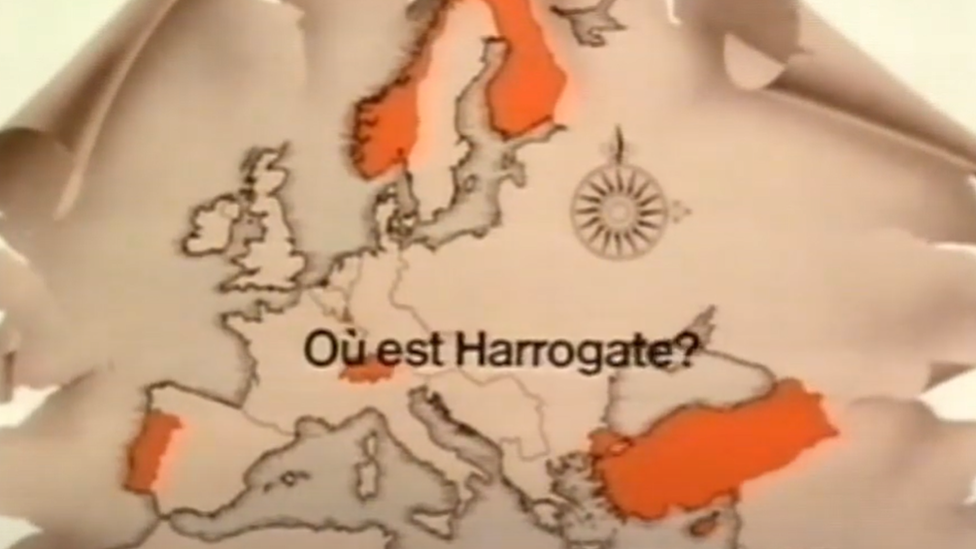
The Eurovision show opened posing the question "Where is Harrogate?"
Newsreader and presenter Jan Leeming was the person the BBC had chosen to host the event and, looking back from the perspective of 2022, she concluded it was "frightening".
"I knew that over 300 million people were watching and Katie Boyle had previously presented it and of course is fluent in French - and I am not.
"I had to take the script away with me and learn it on holiday because the cameras were too far away to use Autocue."
Ms Leeming said she was not sure why the BBC had chosen Harrogate as the host city.
"I think it's because they had the newly-opened conference centre. It was absolutely new and that was the biggest event that they opened it with, really."
Ms Leeming confessed to nerves ahead of the contest and remembered writing in her diary that she "would give a kingdom for a train ticket home".
But, she added: "You have the nerves and once it's the go, the nerves go and you are absorbed in the work."
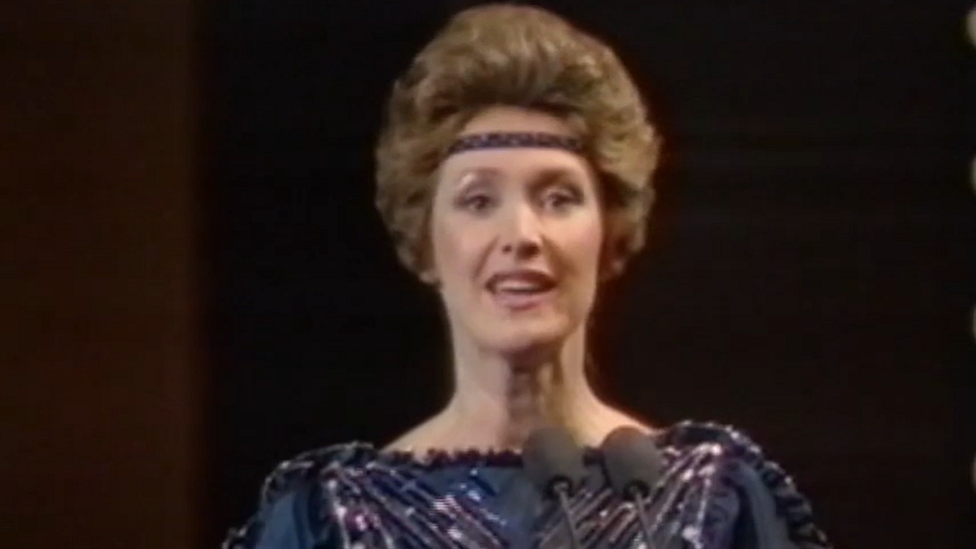
Newsreader Jan Leeming hosted the 1982 Eurovision Song Contest in Harrogate
The nation's hopes for another Eurovision Song Contest victory in 1982 rested with the duo Bardo and their song One Step Further.
One half of the group, Sally Ann Triplett, who went on to forge a successful career in musical theatre, was no Eurovision novice.
At 17, she had been chosen to be part of a six-member group called Prima Donna who represented the UK in 1980.
"It was amazing. It was the year Johnny Logan won with What's Another Year and we came third," she recalled.
When Bardo were chosen for the 1982 contest, Ms Triplett would become one of only a handful of people to take part in Eurovision on more than one occasion.
"We were literally the bookies' favourites. Everyone said we were going to win," she said.
"And, of course, the Falklands War was on and there was a girl in it from Germany singing a song about A Little Bit of Peace, so we didn't really have a leg to stand on."
Despite coming seventh, Bardo's song reached number two in the charts.
John O'Connor said while Bardo were everywhere that year, the German entry, Nicole's A Little Bit of Peace, was clearly going to do well.
"It was so obvious the first time I heard it that Germany were going to run away with it."
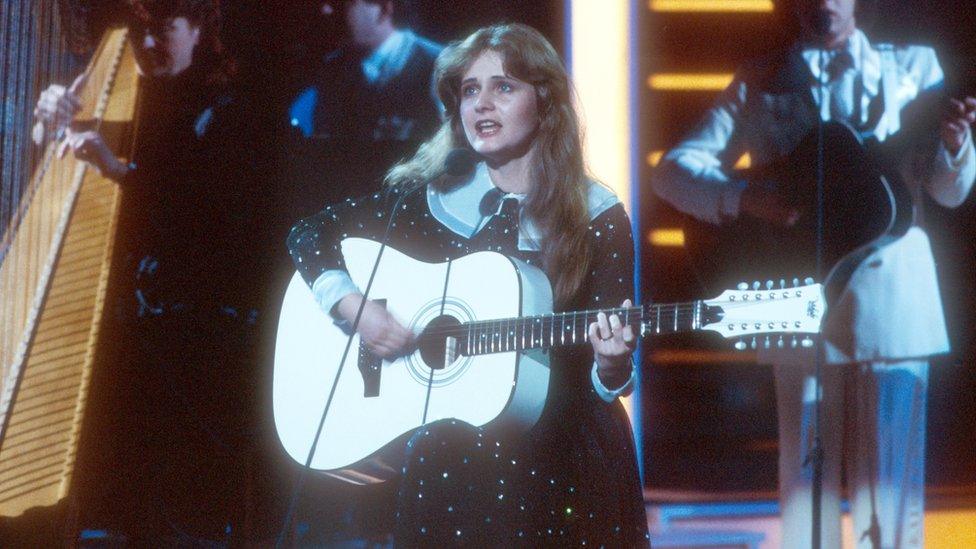
Germany's Nicole took home the prize at the Eurovision Song Contest in Harrogate in 1982
Mr O'Connor said that previously there had been concerns Eurovision was running out of steam, as Italy, France and Greece had withdrawn.
He said: "Having them absent, I think it did create a bit of a negative. A lot of people did think the contest was dying.
"Yet it didn't, because the winner was one of the biggest successes in the history of the contest."
Meanwhile, Sally Ann Triplett, from Bardo, said despite losing out to Nicole, she had very happy memories of her time in Harrogate in 1982.
"It really was extraordinary. When we arrived at our hotel in Harrogate the buzz for us was incredible.
"I have such a soft spot for Harrogate. Looking back, what a great idea to do it in Harrogate. It was a beautiful place to do it."

Follow BBC Yorkshire on Facebook, external, Twitter, external and Instagram, external. Send your story ideas to yorkslincs.news@bbc.co.uk or send video here.